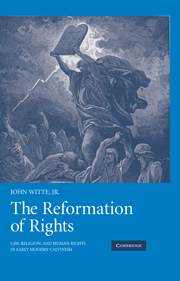Book contents
- Frontmatter
- Contents
- List of illustrations
- Preface and acknowledgments
- List of abbreviations and references
- Introduction
- 1 Moderate (religious) liberty in the theology of John Calvin: The original Genevan experiment
- 2 The duties of conscience and the free exercise of Christian liberty: Theodore Beza and the rise of Calvinist rights and resistance theory
- 3 Natural rights, popular sovereignty, and covenant politics: Johannes Althusius and the Dutch Revolt and Republic
- 4 Prophets, priests, and kings of liberty: John Milton and the rights and liberties of Englishmen
- 5 How to govern a city on a hill: Covenant liberty in Puritan New England
- 6 Concluding reflections: The biography and biology of liberty in early modern Calvinism
- Bibliography
- Index to biblical sources
- Index
6 - Concluding reflections: The biography and biology of liberty in early modern Calvinism
Published online by Cambridge University Press: 05 February 2015
- Frontmatter
- Contents
- List of illustrations
- Preface and acknowledgments
- List of abbreviations and references
- Introduction
- 1 Moderate (religious) liberty in the theology of John Calvin: The original Genevan experiment
- 2 The duties of conscience and the free exercise of Christian liberty: Theodore Beza and the rise of Calvinist rights and resistance theory
- 3 Natural rights, popular sovereignty, and covenant politics: Johannes Althusius and the Dutch Revolt and Republic
- 4 Prophets, priests, and kings of liberty: John Milton and the rights and liberties of Englishmen
- 5 How to govern a city on a hill: Covenant liberty in Puritan New England
- 6 Concluding reflections: The biography and biology of liberty in early modern Calvinism
- Bibliography
- Index to biblical sources
- Index
Summary
The tree [of liberty has] blossomed and yielded its fruit, but without any one having made a botanic study of its nature and growth. Calvinism, in its rise, rather acted than argued [in cultivating this tree]. But now this study may no longer be delayed. Both the biography and the biology of Calvinism must be thoroughly investigated and thought through, or, with our lack of self-knowledge, we shall be side-tracked into a world of ideas that is more at discord than in consonance with the life of our Christian democracy, and cut loose from the root on which we once blossomed so vigorously.
Abraham Kuyper (1898)Herbert Butterfield once wrote of the habit of his fellow English Protestants “to hold some German up their sleeves … and at appropriate moments to strike the unwary Philistine on the head with this secret weapon, the German scholar having decided in a final manner whatever point may have been at issue.” Some Anglo-American Protestants today have a similar habit of holding a secret Dutchman up their sleeves, and woe to that Philistine suddenly confronted with this formidable weapon. The secret Dutchman is Abraham Kuyper (1837–1920), one of the great polymaths in the history of the Netherlands – a theologian and philosopher, journalist and educator, churchman and statesman of astonishing accomplishment. He was the author of more than forty books and untold hundreds of articles. He served for nearly half a century as editor-in-chief of both the Dutch daily Standaard and the weekly Hearaut.
- Type
- Chapter
- Information
- The Reformation of RightsLaw, Religion and Human Rights in Early Modern Calvinism, pp. 321 - 344Publisher: Cambridge University PressPrint publication year: 2008



